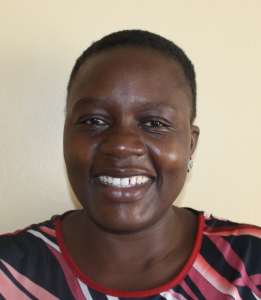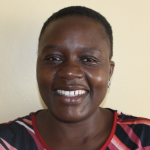"It has not been an easy walk in the park on the issues of water, hygiene, and sanitation matters in this school," said Senior Teacher at Lwombei Primary School, Mrs. Phinorah Khanali.
"Due to lack of water, our morning preps have never been successful as much time is wasted in the morning fetching water. Our girls feel burdened each day when asked to get a second round of water to meet the feeding program's water needs. One time, our girls came screaming as a man at the well had chased them. From that day onward, we have always escorted them to get water. This is a great challenge as they don't get a lot of water from any one source, so a lot of time is wasted in waiting for everyone to get water."
For the 462 students and 16 teachers and staff at Lwombei Primary School, a severe lack of clean water is their daily reality and has been since the school was established in 1941. Sponsored by the Friends Church, the school is a music champion, excelling in the previous music festival up to the provincial level.
And yet, the school struggles to run each day due to its water crisis.
A pupil at Lwombei Primary School wakes up as early as 5:00 am on a typical school day. For a girl, such as Class 7 pupil Naomi, she starts her morning with household chores, sweeping the house, and washing utensils. Then she prepares breakfast and rushes to the river or fetches at least 2 containers of water for her siblings' use. After bathing and taking breakfast, Naomi leaves the house carrying another water and her school bag.
On the way, Naomi draws water from a nearby stream, where she braves the cold and dark to get to school on time. As she arrives at school, she has to be checked by the Master on Duty to see if she has brought water. If so, she can attend the morning preps till 7:00 am when students break and go to assembly for morning prayers and directions from the Head Teacher and the Master on Duty. Any students who arrive at school without water are either punished or sent out again until they come back with water - or both.
At lunchtime, the pupils are sent back out to fetch water once again. Class 7 and 8 pupils like Naomi, who receive lunch from the school, have to fetch at least 1 container of water before eating. Afternoon classes run till 3:45 pm when the pupils start cleaning up their classes and toilets with their water. After cleaning, Class 7 and 8 students remain for preps while the rest of the classes depart to go home.
We followed some of the students to their homes during our visit to observe the water sources they use for school. Several groups bring water from hand-dug wells that are not protected or only partially protected. The water inside looked cloudy and had a mild smell to it. Others fetched water from the river that is open to contamination. With the heavy rains at the time of writing, the river water was brown and filthy.
This daily routine of fetching water for school use is tiresome, time-consuming, and wastes a lot of study and class time for both teachers and students. When students finally get back to class, many are too tired to focus, and their academic performance suffers. This, coupled with absenteeism due to waterborne illnesses, is dragging the entire school's success down.
There have been constant outbreaks of diarrhea, stomachaches, and headaches at Lwombei Primary. The headteacher said he had recently been diagnosed with typhoid and was still on medication to get better. He said he had resolved himself to carrying water from home daily, but sometimes he is not so lucky when he goes to class, and the teachers sneak into his office to steal his personal water.
"Since I joined this school in 2016, to date, I've suffered health-wise and have been admitted to the hospital twice with cases of typhoid. Our students have also been struggling performance-wise due to lack of water in school. We appeal to you to consider our school in the provision of safe and clean drinking water," said Deputy Head Teacher Mr.Teddy Liabeya.
The sanitation and hygiene situation is also wanting and adds to the health problems in the school. There is just 1 handwashing facility which is located close to the staff room. The pupils fear colliding with their teachers at the staff room and rarely attempt to wash their hands. The latrines, many of which are almost full and are no longer structurally sound, are cleaned daily, but due to lack of water, this is done hastily and not thoroughly.
The only water source that has been nonfunctional for a while now is a public standpipe located on school grounds. When it was first installed, water was available 1-2 days per week for about 3 hours each day. While this is normal for what it means to "have" piped water in this area, the school is hopeful the piped water will resume its service. When it does, the rain tank we plan to build will help serve as a storage tank for the piped water, complementing the rainwater.
What We Can Do:
Rain Tank
A 75,000-liter rainwater catchment tank will help alleviate the water crisis at this school. The school will help collect the needed construction materials such as sand, bricks, rocks, and water for mixing cement. We will complement their materials by providing an expert team of artisans, tools, hardware, and the guttering system. Once finished, this tank will begin catching rainfall used by the school’s students and staff for drinking, hand washing, cooking, cleaning, and much more.
The school and we strongly believe that all of these components will work together to improve standards at this school, which will help lead to better student academic performance and unlock the potential for these students to live better, healthier lives.
Handwashing Stations
There is currently nowhere for students to wash their hands after using the latrines or before eating lunch, let alone the water.
The student health club will oversee the 2 new handwashing stations we will provide and ensure they are kept clean and in working condition. The club leaders will fill the handwashing stations with water daily and make sure they are always supplied with a cleaning agent such as soap or ash.
VIP Latrines
2 triple-door latrine blocks will be constructed with local materials that the school will help gather. 3 doors will serve the girls while the other 3 will serve the boys. All of these new latrines will have cement floors that are designed to be easy to use and to clean. And with a rain tank right on school property, there should be enough water to keep them clean.
Training on Health, Hygiene, COVID-19, and More
We will hold a 1-day intensive training session with students, teachers, and parents. This training will cover a wide range of topics, including COVID-19 symptoms, transmission routes, prevention; personal and environmental hygiene; and the operation and maintenance of the rain tank, latrines, and handwashing stations. There will be a special emphasis on handwashing.
Our team of facilitators will use various methods to train, including participatory hygiene and sanitation transformation and asset-based community development. We will initiate a student health club, which will prepare students to lead other pupils into healthy habits at school and home. We will also lead lectures, group discussions and provide illustrative handouts to teach health topics and promote good hygiene practices within the school, including handwashing and water treatment. We will then conduct a series of follow-up training before transitioning to our regularly scheduled support visits throughout the year.



 Rehabilitation Project
Rehabilitation Project









































